Pew Research Center has been studying the role of technology and technology companies in Americans’ lives for many years. This study was conducted to understand Americans’ views about the role of major technology companies in the political landscape. For this analysis, we surveyed 4,708 U.S. adults from June 16 to 22, 2020. Everyone who took part is a member of the Center’s American Trends Panel (ATP), an online survey panel that is recruited through national, random sampling of residential addresses. This way nearly all U.S. adults have a chance of selection. The survey is weighted to be representative of the U.S. adult population by gender, race, ethnicity, partisan affiliation, education and other categories. Read more about the ATP’s methodology.
Here are the questions used for this report, along with responses, and its methodology.
Americans have complicated feelings about their relationship with big technology companies. While they have appreciated the impact of technology over recent decades and rely on these companies’ products to communicate, shop and get news, many have also grown critical of the industry and have expressed concerns about the executives who run them.
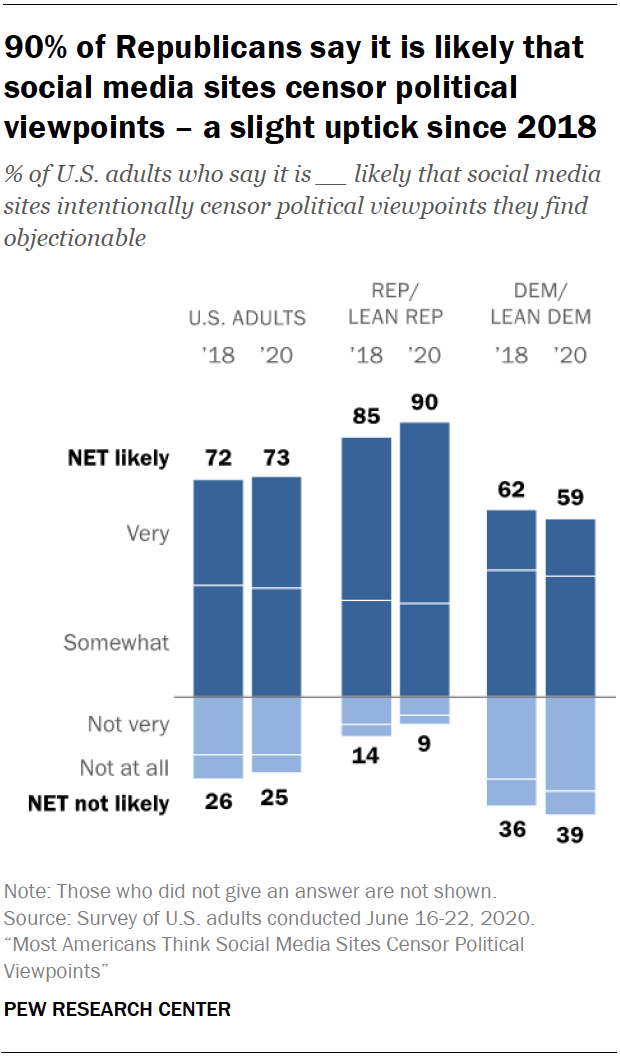 This has become a particularly pointed issue in politics – with critics accusing tech firms of political bias and stifling open discussion. Amid these concerns, a Pew Research Center survey conducted in June finds that roughly three-quarters of U.S. adults say it is very (37%) or somewhat (36%) likely that social media sites intentionally censor political viewpoints that they find objectionable. Just 25% believe this is not likely the case.
This has become a particularly pointed issue in politics – with critics accusing tech firms of political bias and stifling open discussion. Amid these concerns, a Pew Research Center survey conducted in June finds that roughly three-quarters of U.S. adults say it is very (37%) or somewhat (36%) likely that social media sites intentionally censor political viewpoints that they find objectionable. Just 25% believe this is not likely the case.
Majorities in both major parties believe censorship is likely occurring, but this belief is especially common – and growing – among Republicans. Nine-in-ten Republicans and independents who lean toward the Republican Party say it’s at least somewhat likely that social media platforms censor political viewpoints they find objectionable, up slightly from 85% in 2018, when the Center last asked this question.
At the same time, the idea that major technology companies back liberal views over conservative ones is far more widespread among Republicans. Today, 69% of Republicans and Republican leaners say major technology companies generally support the views of liberals over conservatives, compared with 25% of Democrats and Democratic leaners. Again, these sentiments among Republicans have risen slightly over the past two years.
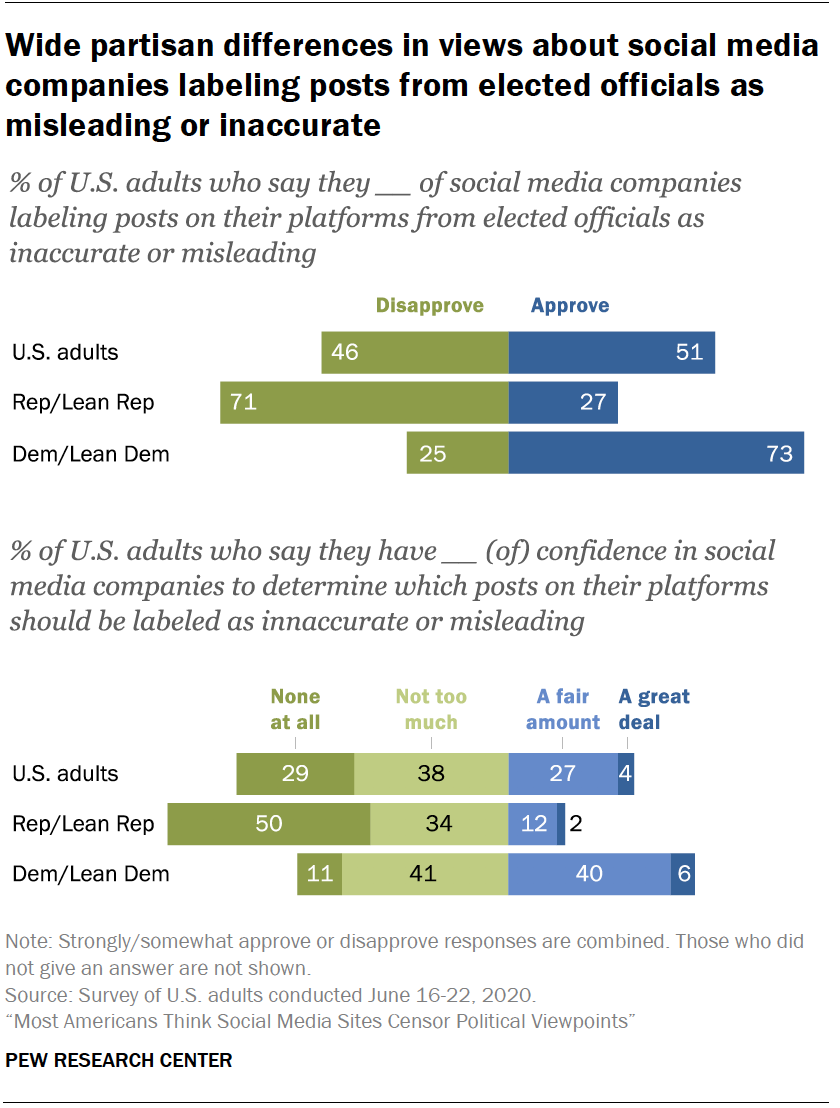 Debates about censorship grew earlier this summer following Twitter’s decision to label tweets from President Donald Trump as misleading. This prompted some of the president’s supporters to charge that these platforms are censoring conservative voices.
Debates about censorship grew earlier this summer following Twitter’s decision to label tweets from President Donald Trump as misleading. This prompted some of the president’s supporters to charge that these platforms are censoring conservative voices.
This survey finds that the public is fairly split on whether social media companies should engage in this kind of fact-checking, but there is little public confidence that these platforms could determine which content should be flagged.
Partisanship is a key factor in views about the issue. Fully 73% of Democrats say they strongly or somewhat approve of social media companies labeling posts on their platforms from elected officials as inaccurate or misleading. On the other hand, 71% of Republicans say they at least somewhat disapprove of this practice. Republicans are also far more likely than Democrats to say they have no confidence at all that social media companies would be able to determine which posts on their platforms should be labeled as inaccurate or misleading (50% vs. 11%).
These are among the key findings of a Pew Research Center survey of 4,708 U.S. adults conducted June 16-22, 2020, using the Center’s American Trends Panel.
Views about whether social media companies should label posts on their platforms as inaccurate are sharply divided along political lines
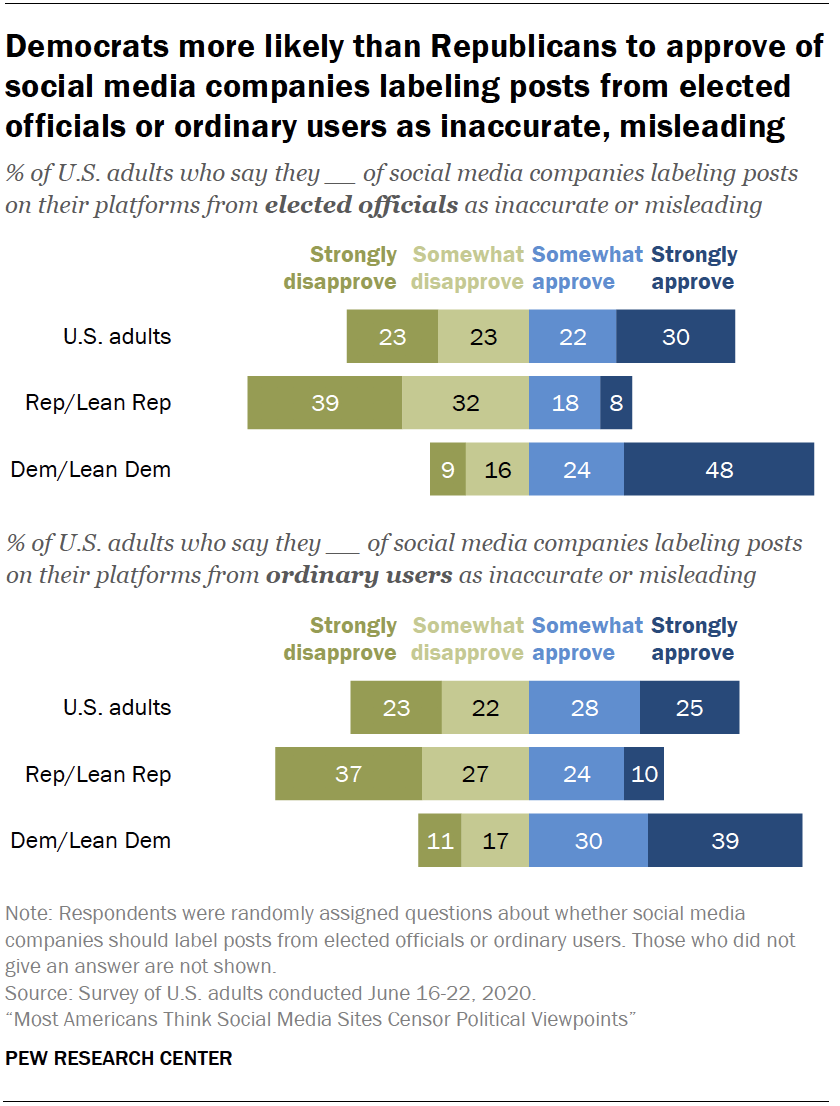 Americans are divided over whether social media companies should label posts on their sites as inaccurate or misleading, with most being skeptical that these sites can accurately determine what content should be flagged.
Americans are divided over whether social media companies should label posts on their sites as inaccurate or misleading, with most being skeptical that these sites can accurately determine what content should be flagged.
Some 51% of Americans say they strongly or somewhat approve of social media companies labeling posts from elected officials on their platforms as inaccurate or misleading, while a similar share (46%) say they at least somewhat disapprove of this.
Democrats and Republicans hold contrasting views about the appropriateness of social media companies flagging inaccurate information on their platforms. Fully 73% of Democrats say they strongly or somewhat approve of social media companies labeling posts on their platforms from elected officials as inaccurate or misleading, versus 25% who disapprove.
These sentiments are nearly reversed for Republicans: 71% say they disapprove of social media companies engaging in this type of labeling, including about four-in-ten (39%) who say they strongly disapprove. Just 27% say they approve of this labeling.
Liberal Democrats stand out as being the most supportive of this practice: 85% of this group say they approve of social media companies labeling elected officials’ posts as inaccurate or misleading, compared with 64% of conservative or moderate Democrats and even smaller shares of moderate or liberal Republicans and conservative Republicans (38% and 21%, respectively).
In addition to measuring public attitudes about flagging potentially misleading content from elected officials, the survey explored Americans’ views about whether this practice would be acceptable to apply to posts from ordinary users. Some 52% of Americans say they strongly or somewhat approve of social media companies labeling posts from ordinary users on their platforms as inaccurate or misleading, while 45% disapprove.
Again, views vary widely by party. While seven-in-ten Democrats approve of these sites labeling posts from ordinary users as inaccurate or misleading, that share falls to 34% among Republicans. Americans’ support – or lack thereof – for flagging content on social media is similar whether applied to posts by politicians or everyday users.
But the public as a whole does not trust that these companies will be able to decide on which posts should be labeled as misleading. Overall, a majority of Americans (66%) say they have not too much or no confidence at all in social media companies being able to determine which posts on their platforms should be labeled as inaccurate or misleading, with 31% saying they have a great deal or some confidence.
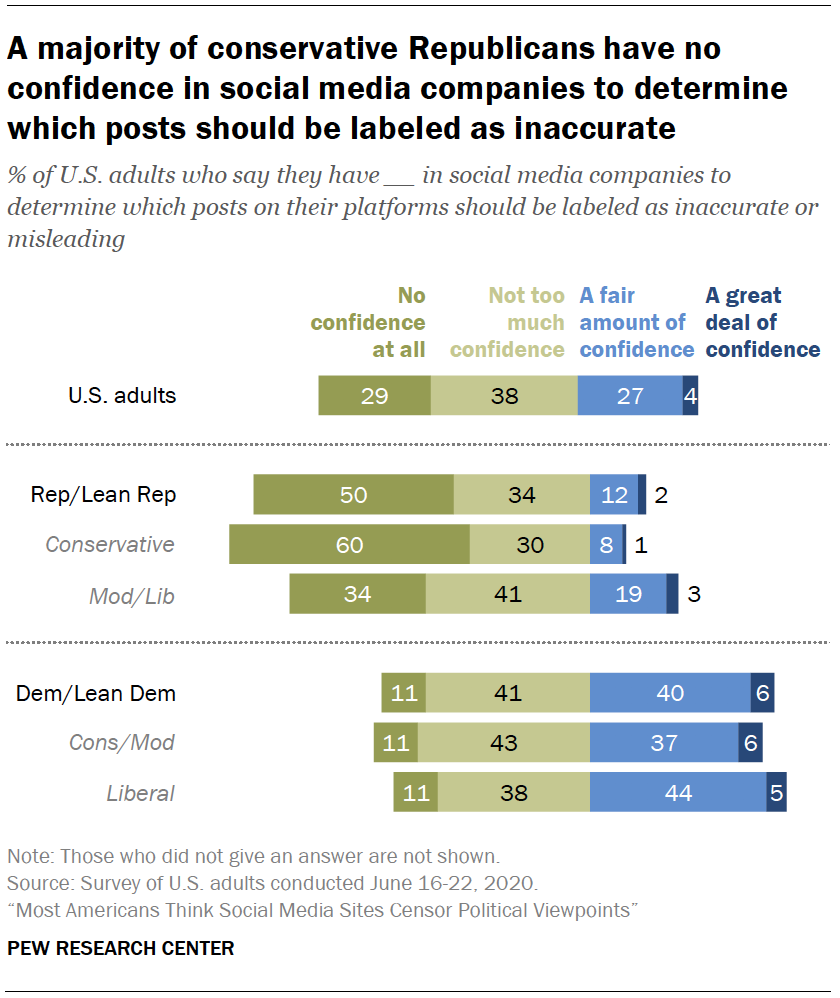 Republicans are far more likely than Democrats to express skepticism that social media companies could properly determine which posts should be labeled in this way. More than eight-in-ten Republicans say they have no (50%) or not much (34%) confidence regarding social media companies’ ability to determine which posts on their platforms should be labeled.
Republicans are far more likely than Democrats to express skepticism that social media companies could properly determine which posts should be labeled in this way. More than eight-in-ten Republicans say they have no (50%) or not much (34%) confidence regarding social media companies’ ability to determine which posts on their platforms should be labeled.
Democrats are more evenly split in their views: Some 52% of Democrats say they have no confidence at all or not too much confidence in social media companies to determine which posts on their platforms should be labeled as inaccurate or misleading, while 46% say they have a great deal or fair amount of confidence.
Beyond that, there are notable differences along partisan and ideological lines. Six-in-ten conservative Republicans say they have no confidence in social media companies’ ability to determine which posts on their platforms should be labeled as misleading, compared with 34% of moderate or liberal Republicans and 11% each of conservative or moderate Democrats and liberal Democrats.
Americans who approve of social media companies labeling posts express more confidence that these sites could properly flag inaccurate content. Indeed, 54% of those who approve of labeling elected officials’ posts as misleading say they have at least a fair deal of confidence in social media companies to determine which posts to label, while only 9% of those who disapprove of labeling elected officials’ posts say the same. A similar pattern is present when asked about this type of labeling for ordinary users.
The confidence gap between Republicans and Democrats remains present even among those who approve of this type of flagging. Some 56% of Democrats who approve of social media platforms labeling elected officials’ posts as inaccurate say they have at least a fair amount of confidence in these companies to determine which posts to label, compared with 42% of Republicans who approve of labeling elected officials’ posts as misleading or inaccurate. This partisan gap is even larger among those who approve of labeling ordinary users’ posts. Roughly six-in-ten Democrats (58%) who approve of labeling ordinary users’ posts express a great deal or a fair amount of confidence in social media companies to determine which posts to label, while 30% of their Republican counterparts say that.
Majorities across parties – but particularly Republicans – say it is at least somewhat likely social media sites censor political views they find objectionable
Americans by and large believe social media companies are censoring political viewpoints they find objectionable. Roughly three-quarters of Americans (73%) think it is very or somewhat likely that social media sites intentionally censor political viewpoints they find objectionable, including 37% who say this is very likely.
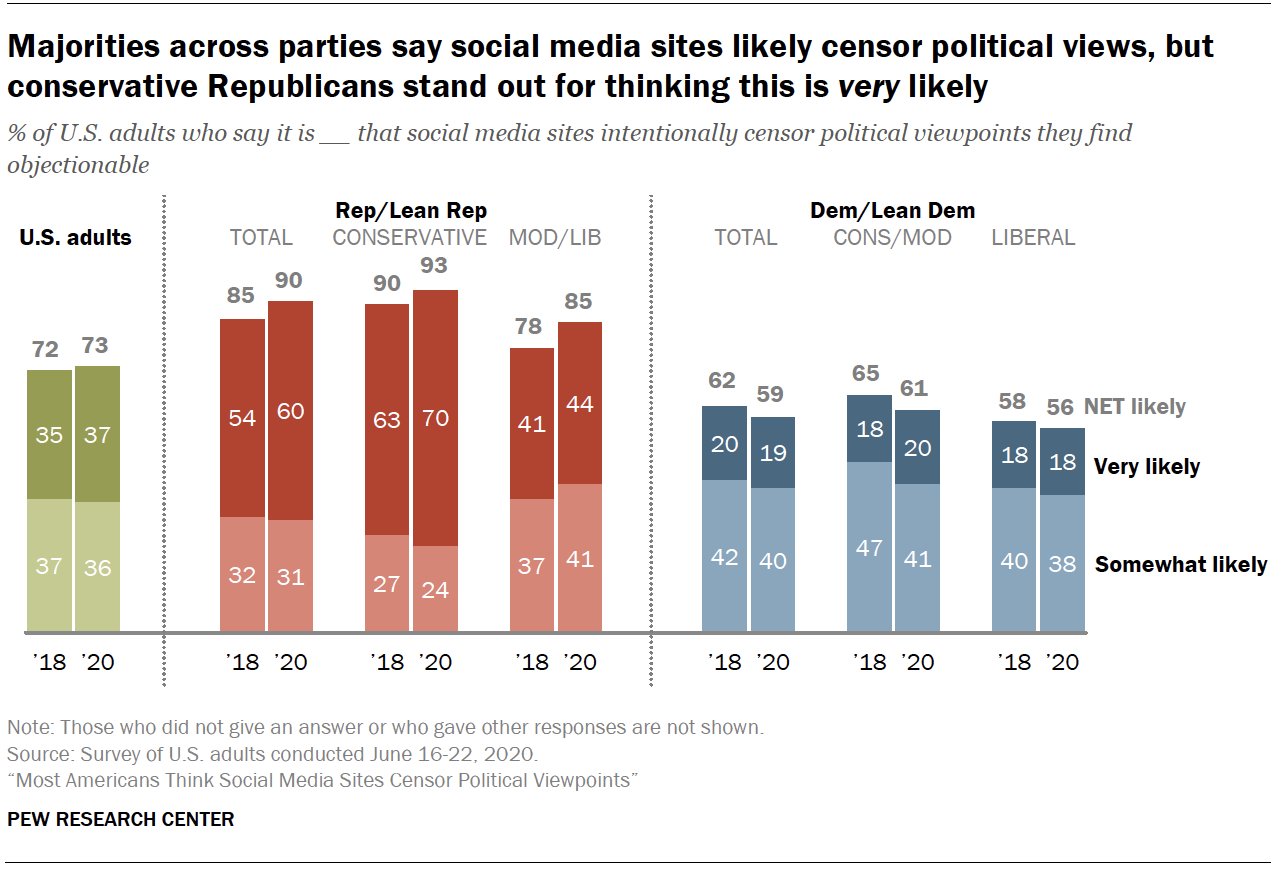
Larger shares in both parties think it’s likely that these sites engage in political censorship, but this belief is especially widespread among Republicans. Fully 90% of Republicans say that social media sites intentionally censor political viewpoints that they find objectionable – with 60% saying this is very likely the case. By comparison, fewer Democrats believe this to be very (19%) or somewhat (40%) likely.
Republicans – but not Democrats – are divided along ideological lines on the issue. Conservative Republicans are far more likely than moderate or liberal Republicans to say it is very likely that social media sites intentionally censor political viewpoints they find objectionable (70% vs. 44%). Similar shares of moderate or conservative Democrats (20%) and liberal Democrats (18%) express this view.
While these overall views about censorship are on par with those in 2018, there has been a slight uptick in the share of Republicans who think censorship is likely the norm on social media. Today, 90% of Republicans believe it is very or somewhat likely that social media sites intentionally censor political viewpoints – a modest yet statistically significant increase from 2018, when 85% expressed this view. The share of conservative Republicans who say this is very likely the case rose 7 points, from 63% in 2018 to 70% in 2020. Views among moderate and liberal Republicans, as well as Democrats across the ideological spectrum, have not significantly changed since 2018.
Roughly seven-in-ten Republicans say major technology companies tend to support the views of liberals over conservatives
While most Republicans and Democrats believe it’s likely that social media sites engage in censoring political viewpoints, they do diverge on which views they think major technology companies tend to favor.
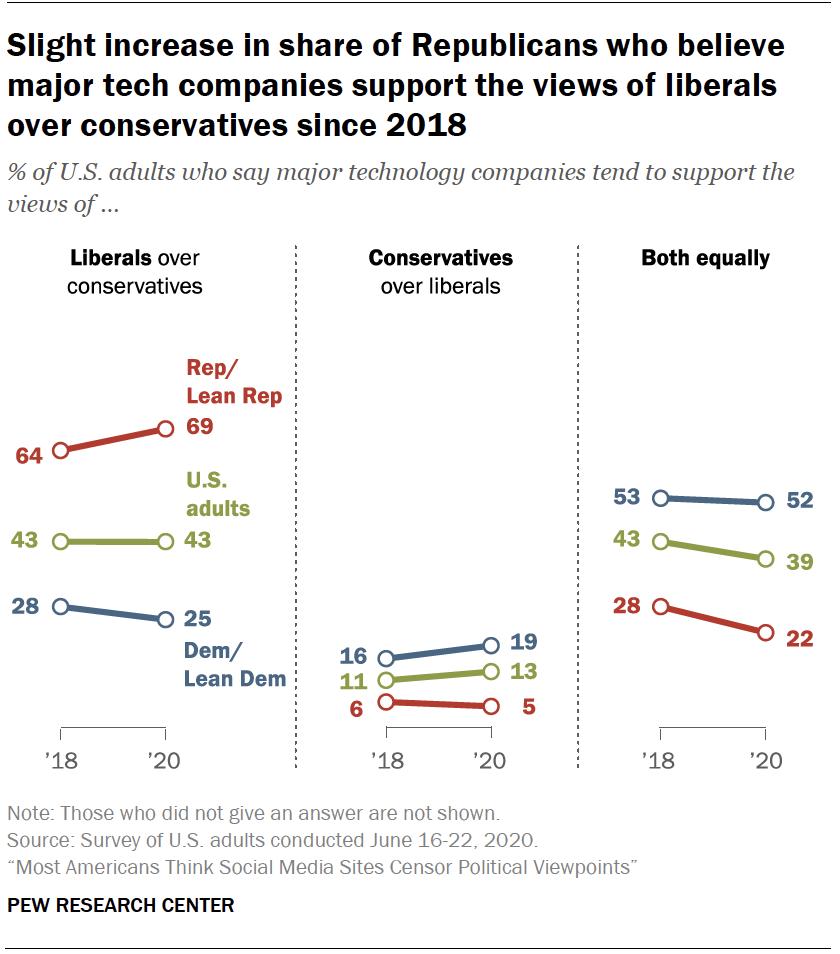 On a broad level, a plurality of Americans say major technology companies tend to support the views of liberals over conservatives, rather than conservatives over liberals (43% vs. 13%). Still, about four-in-ten (39%) say major tech companies tend to support the views of conservatives and liberals equally. The share who say major technology companies equally support the views of conservatives and liberals has slightly decreased since 2018, while the other two sentiments are statistically unchanged.
On a broad level, a plurality of Americans say major technology companies tend to support the views of liberals over conservatives, rather than conservatives over liberals (43% vs. 13%). Still, about four-in-ten (39%) say major tech companies tend to support the views of conservatives and liberals equally. The share who say major technology companies equally support the views of conservatives and liberals has slightly decreased since 2018, while the other two sentiments are statistically unchanged.
Public attitudes on this issue are highly partisan. Today, 69% of Republicans say major technology companies favor the views of liberals over conservatives, while 22% say these companies support the views of liberals and conservatives equally. Few Republicans (5%) believe that conservative sentiments are valued more than liberal ones by these companies.
By comparison, one-quarter of Democrats say major technology companies support liberal views over conservative ones, while 19% say conservative sentiments are the ones that are more valued. About half of Democrats (52%) believe tech companies treat these views equally.
There are also large differences when accounting for political ideology. For example, 81% of conservative Republicans say big technology companies favor liberal views, compared with half of moderate or liberal Republicans and even smaller shares of conservative or moderate Democrats (24%) and liberal Democrats (26%).
When asked about the preference of conservative views, 23% of liberal Democrats – a slightly larger share than the 16% in 2018 – say that major technology companies favor these views over liberal ones, compared with 10% or fewer of moderate to liberal and conservative Republicans.
"social" - Google News
August 19, 2020 at 11:30PM
https://ift.tt/34dDKeJ
Most Americans Think Social Media Sites Censor Political Viewpoints - Pew Research Center's Internet and American Life Project
"social" - Google News
https://ift.tt/38fmaXp
https://ift.tt/2WhuDnP
Bagikan Berita Ini















0 Response to "Most Americans Think Social Media Sites Censor Political Viewpoints - Pew Research Center's Internet and American Life Project"
Post a Comment